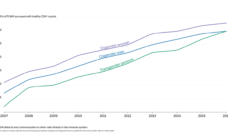Black females are disproportionately afflicted by high rates of sexually transmitted infections, adolescent pregnancy, homicide, and forms of violence compared to women of other races. These disparities are not attributable to behavioral differences; rather, they largely result from social forces that Natasha Crooks and colleagues recently explored in their study of Black females’ sexual development across the life course.
The researchers conducted interviews with 20 Black females aged 19-62 recruited from the community in Madison, Wisconsin and developed a framework of three major phases of sexual development: “Girl,” “Grown,” and “Woman.”
“Girl,” the phase between age five to 14, was characterized by early physical development and menses. A participant stated, “One of the things about being a little [Black] girl is that I developed so quickly. I was in the third grade with my breasts a little fuller. My hips were a little fuller.” Most participants recounted being naive, vulnerable, and lacking power over decisions at that age. Many recalled being manipulated into first sexual encounters as early as 10 years old and described society viewing them as women when they were still girls. One participant explained, “When you’re [a] Black [girl], you are not really treated like a minor.”
Physical maturation often prompted unwanted male attention, which caused many participants to feel shame. One participant detailed, “The blame is always put back on the young girl. I could be…molested or harassed in church, but it would be…put on me.” Participants received little to no sexual education from parents, were given misinformation by peers, or endured a “culture of silence.” One reported, “[Parents] don’t want to have their kids follow in their footsteps. You know, my mom was a teen mom. I was a teen mom. My mom was 14. I was 17. I think it’s just a scary conversation.” Participants wished a trusted adult had shared knowledge about sex and useful methods to manage unwanted sexual advances.
“My background as a nurse in women’s sexual and reproductive health, as well as my personal experiences as a Black woman and with other women of color, motivated me to conduct the study.”
“Grown,” defined by participants as the transition from childhood to adulthood, was usually between 11 and 18 years old and was either self-defined or identified by others. When self-identified, being “grown” indicated being responsible, whereas being labeled as “grown” by others suggested adult appearance or behavior.
During “grown,” many participants described having unprotected sex. As one participant noted, “The sex validated who I was back then.” “Grown” behavior was often categorized as being promiscuous and was the norm, especially in college. Many participants stated that they remained naive about their sexuality and searched for information from the internet, peers, health care providers, and college courses.
Becoming a “woman” typically occurred after becoming a parent or at age 18. A “woman” developed a strong sense of self and identified the distinct challenges of her intersecting identities. One participant commented, “It’s not enough that we’re Black and that’s… you know, looked down upon already as the minority…but we’re women, too.”
As “women”, participants embraced their sexuality. Instead of having things being done to their bodies, they became active participants in their sexual experiences and developed a desire to form deeper connections with their partners. “Women” redefined themselves beyond the role of a sexual partner, as “independent, strong and just not trying to fit into…the world’s view of a Black woman.” One woman discussed how society “misconceives the whole purpose of being a Black woman. Like, it’s not just about how sexy you are and how your curves are.” Another said that Black women reframe that notion: “Being a Black woman…is to be yourself.”
Study author Dr. Crooks told Public Health Post, “My background as a nurse in women’s sexual and reproductive health, as well as my personal experiences as a Black woman and with other women of color, motivated me to conduct the study.” Her work centers on addressing sexual health disparities among Black women and emphasizes the need “to speak to the people who embody lived experiences to capture what they are going through. They are the experts.”
Photo by Suad Kamardeen on Unsplash














